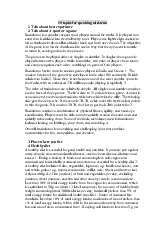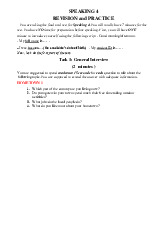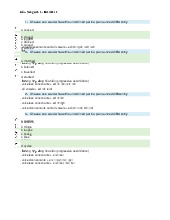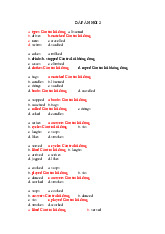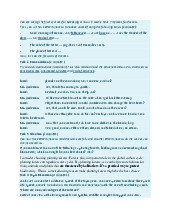




Preview text:
lOMoAR cPSD| 59943509
Hanoi Open University Learning Opportunity for All
Comparative forms of adjectives and adverbs Form - Short adj / adv S
+ V + adj / adv + ER + THAN + noun / pronoun / clause
My sister is taller than me. - Long adj / adv S
+ V + MORE + adj. / adv. + THAN + noun / pronoun /
clause She sings more beautifully than she used to be.
- much, far, a lot, a bit, a little, rather, slightly can be used before comparative.
His watch is much / far more expensive than mine.
I got up a little later than usual.
Exercise 6.13. Use the comparative form of the word in the blanket to complete the sentences.
1. Can't you think of anything _____________(intelligent) to say?
2. Well, the place looks _____________(clean) now.
3. Janet looks ____________(thin) than she did.
4. You need to draw it ______________(carefully)
5. The weather is getting ___________ (bad).
6. The programme will be shown at a __________ (late) date.
7. I can't stay ________________(long) than half an hour.
8. A mobile phone would be a_______________ (useful) present. Nói_Tiế Trang 1 lOMoAR cPSD| 59943509
Hanoi Open University Learning Opportunity for All
9. I'll try to finish the job ________________ (soon).
10. Since the break-in I feel ____________ (nervous).
Intonation patterns in different speech acts
We perform speech acts when we offer an apology, greeting, request, complaint,
invitation, compliment, or refusal. A speech act is an utterance that serves a function in
communication. A speech act might contain just one word, as in "Sorry!" to perform an
apology, or several words or sentences: "I’m sorry I forgot your birthday. I just let it slip
my mind." Speech acts include real-life interactions and require not only knowledge
of the language but also appropriate use of that language within a given culture.
Intonation is about how we say things, rather than what we say. Without intonation, it's
impossible to understand the expressions and thoughts that go with words. There are
common intonation patterns for specific conversational actions.
- To ask for clarification or to express surprise, use a rising intonation
This tomato is genetically altered? (I’m not sure I understand you) You
eat five hamburgers a day!
(I am surprised by this information) - For
Yes/No question, also use a rising intonation.
Would you like coffee? (You can say yes or no to my question)
- To list items, use a rising intonation for each item on the list. For the last item, use a rising/falling intonation.
I ate eggs, bacon, and cereal. (I ate three things)
- To offer a choice between two things, use a rising/falling intonation. Would you
like coffee or iced tea? (Which would you prefer?)
Exercise 6.14. Listen to the sentences. Draw intonation arrow over each one. (Track 6.3)
1. What? You’ve never eaten a tomato.
2. Do you prefer water or juice? Nói_Tiế Trang 2 lOMoAR cPSD| 59943509
Hanoi Open University Learning Opportunity for All
3. My favourite foods are rice, yams, and pizza.
4. What did you say? You don’t like ice cream?
5. Are you hungry? Do you want some bread and cheese? ng Anh 6 – Unit 6
Expressing interests
Expressing interest during a conversation shows the speaker you are paying attention.
There are several ways to express interests in the speaker’s ideas. In addition to leaning
forward or making eye contact, you can use special words and phrases to show you are
interested in what the speaker is saying.
The following expressions can be used to express interest: That sounds interesting.
I’ve always wanted to ……... I was hoping to……….
I wouldn’t mind………….
Yeah. / Wow! / Mm-hmm. / Cool! Really?
Interesting! / That’s amazing!
It is not necessary to wait until the speaker has finished talking to use these words or
phrases. You can use them throughout the conversation, whenever the speaker completes a thought.
Exercise 2.15. Intonation can be used to express interest. Listen to the sentences
and write I for interested or U for uninterested. (Track 6.4) Oh, is that on tonight? (interested)
Oh, is that on tonight? (uninterested) Nói_Tiế Trang 3 lOMoAR cPSD| 59943509
Hanoi Open University Learning Opportunity for All
1. ……….You are going to watch that movie tonight, aren’t you?
2. ……….What time does it start?
3. ……….Oh, is this on again?
4. ……….Oh, it’s the one where they go to Las Vegas.
5. ……….You don’t want to watch it?
6. ……….It’s that new show they’ve been advertising.
Talk about how air pollution has affected our life.
In this assignment, you are going to talk about how air pollution has affected our life. A. GATHER IDEAS
…………………………………………………………………………………………... B. ORGANIZE IDEAS
…………………………………………………………………………………………... C. PRESENT
…………………………………………………………………………………………... Nói_Tiế Trang 4 lOMoAR cPSD| 59943509
Hanoi Open University Learning Opportunity for All ng Anh 6 – Unit 6 Nói_Tiế Trang 5
